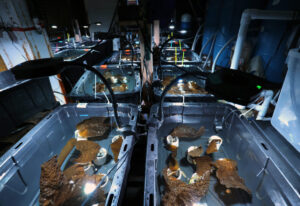
News, Research, Featured
News, Research, Featured
News, Research, Featured
The Future of Seaweed
Newly published in Ecosphere, an esa open access journal, and co-authored by our own Dr. Lauren Bell is a review of her lab work from 2022 conducted at Sitka Sound Science Center Season influences interspecific responses of canopy‐forming kelps to future warming and acidification at high latitude – Bell – 2024 – Ecosphere – Wiley Online Library.
During her graduate work Dr. Bell studied the effects of climate change in relation to seasonal changes on three varieties of common kelp species found in the waters of southeast Alaska. Giant Kelp Macrocystis pyrifera, Split Kelp Hedophyllum nigripes, and Sieve Kelp Neoagarum fimbriatum were grown in the laboratory under the warmer, more acidic ocean conditions projected in Southeast Alaska at the end of the century due to climate change. Dr. Bell’s findings revealed that some kelp species may be fairly resilient to changing ocean conditions, whereas other kelp species may respond with reduced growth and nutritional content in the future.
These findings will help in future models projecting overall climate change effects in our oceans. All kelp species used in the study are vital in our current ecosystem, serving as critical habitat and food for many other marine species. As foundational species in our coastal food web, what happens to the kelp can have knock-on effects all the way up the food chain impacting fish, whales, and even terrestrial animals like eagles, deer, bears, and humans. This work represents the first consideration of how projected climate change may impact southeast Alaska kelp species and is an important next step in helping us anticipate the complex impacts of climate change within our vital coastal ecosystems.
Read Dr. Bell’s full paper here

Photo of Dr. Bell’s experiment taken by Anna Laffery.
Featured photo by Michael Langhans.
